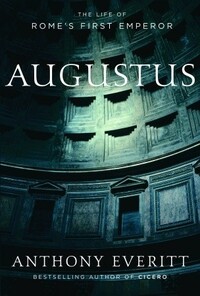You need to sign in or sign up before continuing.
Take a photo of a barcode or cover
Good introduction into Augustus's life. Some interesting story telling choices but solid overall
Very good, if speculative in places, biography of Augustus. Shows his cunning and utter ruthlessness in building a fallen Republic into a viable empire.
Although less fond of this one than of Everitt's life of Cicero, that may have more to do with the subject matter than the writing. And Augustus' life is always, to my mind, a thoughtful warning to all Americans . . .
Solid biography grounded in classical sources, adept at separating Augustus' reality from his very clever propaganda machine and set within the greater Mediterranean context of the first century.
An interesting read. After I read and enjoyed [b:The Rise of Rome: The Making of the World's Greatest Empire|13155133|The Rise of Rome The Making of the World's Greatest Empire|Anthony Everitt|https://images.gr-assets.com/books/1344368906s/13155133.jpg|18333385] and [b:Cicero: The Life and Times of Rome's Greatest Politician|84593|Cicero The Life and Times of Rome's Greatest Politician|Anthony Everitt|https://images.gr-assets.com/books/1320502320s/84593.jpg|81654] by the same author, I decided to read this one as well. It didn’t disappoint, and is packed with discussions of multiple larger-than-life figures. In addition to Caesar Augustus, they included Julius Caesar, Brutus, Cassius, Mark Antony, and Cleopatra. I also liked the numerous quotes from famous contemporaries, including Virgil, Horace, and Livy, as well as works by slightly later classical writers such as Suetonius and Plutarch (and the events would have been within living memory during their time). A few later classical historians, who wrote between 150-200 years afterward (Appian and Dio), were also quoted. Including all of them gave insights into the mindset of the time and how people perceived (or grew to perceive) the events described as they unfolded (or shortly after they unfolded), unadulterated by several thousand years of speculation and shifting ideals and expectations. It is unfortunate more did not survive the Dark Ages, especially because Augustus wrote a now-lost autobiography.
The short descriptions of the situation in the waning Roman Republic also struck me as sounding very much like the situation in the modern-day United States: “What looked in many ways like a democracy was, in fact, an oligarchy modified by elections.” (page 5).
Another good quote: “In the long run power [is] unsustainable without consent.” (page 325).
The short descriptions of the situation in the waning Roman Republic also struck me as sounding very much like the situation in the modern-day United States: “What looked in many ways like a democracy was, in fact, an oligarchy modified by elections.” (page 5).
Another good quote: “In the long run power [is] unsustainable without consent.” (page 325).
informative
3.5 stars. I am very biased since Augustus is my favourite of the Caesars and I haven’t found great biographies of Augustus available easily so this one was great for me if a little introductory in nature.
informative
reflective



